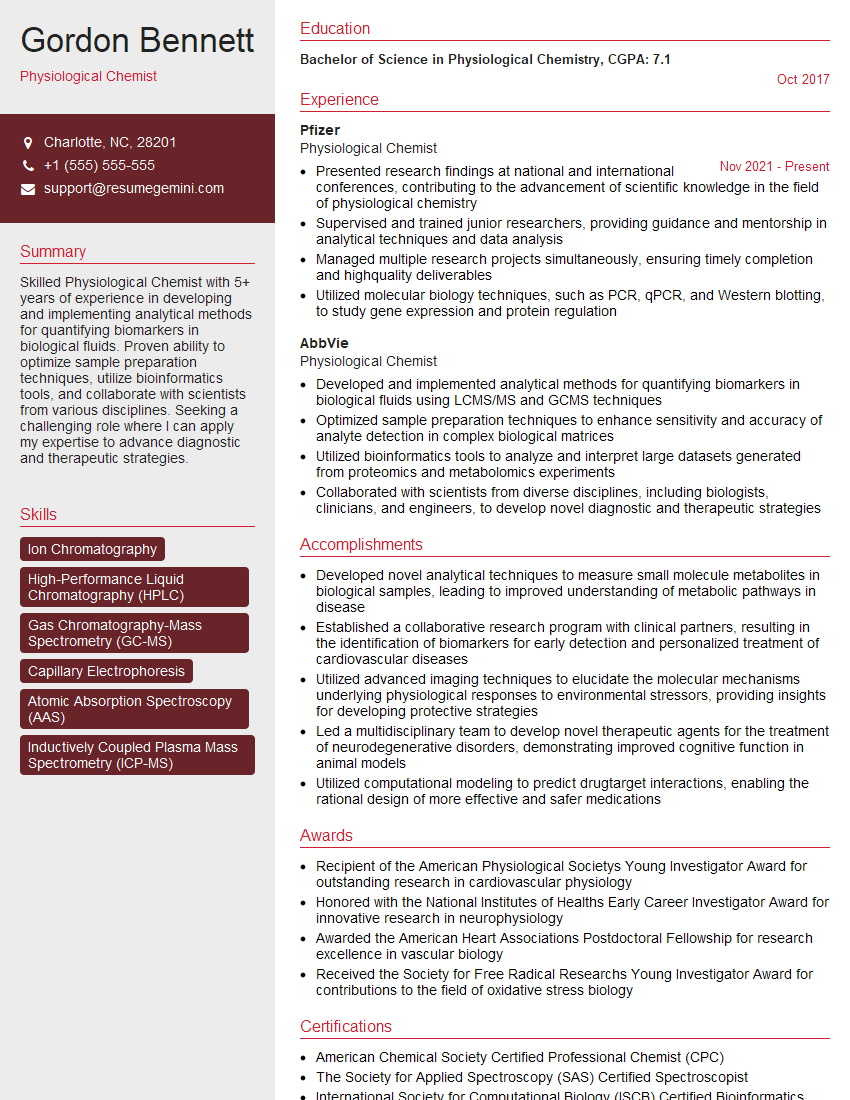Are you a seasoned Physiological Chemist seeking a new career path? Discover our professionally built Physiological Chemist Resume Template. This time-saving tool provides a solid foundation for your job search. Simply click “Edit Resume” to customize it with your unique experiences and achievements. Customize fonts and colors to match your personal style and increase your chances of landing your dream job. Explore more Resume Templates for additional options.

Gordon Bennett
Physiological Chemist
Summary
Skilled Physiological Chemist with 5+ years of experience in developing and implementing analytical methods for quantifying biomarkers in biological fluids. Proven ability to optimize sample preparation techniques, utilize bioinformatics tools, and collaborate with scientists from various disciplines. Seeking a challenging role where I can apply my expertise to advance diagnostic and therapeutic strategies.
Education
Bachelor of Science in Physiological Chemistry
October 2017
Skills
- Ion Chromatography
- High-Performance Liquid Chromatography (HPLC)
- Gas Chromatography-Mass Spectrometry (GC-MS)
- Capillary Electrophoresis
- Atomic Absorption Spectroscopy (AAS)
- Inductively Coupled Plasma Mass Spectrometry (ICP-MS)
Work Experience
Physiological Chemist
- Presented research findings at national and international conferences, contributing to the advancement of scientific knowledge in the field of physiological chemistry
- Supervised and trained junior researchers, providing guidance and mentorship in analytical techniques and data analysis
- Managed multiple research projects simultaneously, ensuring timely completion and highquality deliverables
- Utilized molecular biology techniques, such as PCR, qPCR, and Western blotting, to study gene expression and protein regulation
Physiological Chemist
- Developed and implemented analytical methods for quantifying biomarkers in biological fluids using LCMS/MS and GCMS techniques
- Optimized sample preparation techniques to enhance sensitivity and accuracy of analyte detection in complex biological matrices
- Utilized bioinformatics tools to analyze and interpret large datasets generated from proteomics and metabolomics experiments
- Collaborated with scientists from diverse disciplines, including biologists, clinicians, and engineers, to develop novel diagnostic and therapeutic strategies
Accomplishments
- Developed novel analytical techniques to measure small molecule metabolites in biological samples, leading to improved understanding of metabolic pathways in disease
- Established a collaborative research program with clinical partners, resulting in the identification of biomarkers for early detection and personalized treatment of cardiovascular diseases
- Utilized advanced imaging techniques to elucidate the molecular mechanisms underlying physiological responses to environmental stressors, providing insights for developing protective strategies
- Led a multidisciplinary team to develop novel therapeutic agents for the treatment of neurodegenerative disorders, demonstrating improved cognitive function in animal models
- Utilized computational modeling to predict drugtarget interactions, enabling the rational design of more effective and safer medications
Awards
- Recipient of the American Physiological Societys Young Investigator Award for outstanding research in cardiovascular physiology
- Honored with the National Institutes of Healths Early Career Investigator Award for innovative research in neurophysiology
- Awarded the American Heart Associations Postdoctoral Fellowship for research excellence in vascular biology
- Received the Society for Free Radical Researchs Young Investigator Award for contributions to the field of oxidative stress biology
Certificates
- American Chemical Society Certified Professional Chemist (CPC)
- The Society for Applied Spectroscopy (SAS) Certified Spectroscopist
- International Society for Computational Biology (ISCB) Certified Bioinformatics Scientist (CBS)
Career Expert Tips:
- Select the ideal resume template to showcase your professional experience effectively.
- Master the art of resume writing to highlight your unique qualifications and achievements.
- Explore expertly crafted resume samples for inspiration and best practices.
- Build your best resume for free this new year with ResumeGemini. Enjoy exclusive discounts on ATS optimized resume templates.
How To Write Resume For Physiological Chemist
- Highlight your expertise in analytical techniques, particularly LC-MS/MS and GC-MS.
- Quantify your accomplishments with specific metrics whenever possible.
- Showcase your ability to work independently and as part of a team.
- Demonstrate your passion for physiological chemistry and its applications.
- Proofread your resume carefully for any errors.
Essential Experience Highlights for a Strong Physiological Chemist Resume
- Developed and implemented analytical methods for quantifying biomarkers in biological fluids using LC-MS/MS and GC-MS techniques.
- Optimized sample preparation techniques to enhance sensitivity and accuracy of analyte detection in complex biological matrices.
- Utilized bioinformatics tools to analyze and interpret large datasets generated from proteomics and metabolomics experiments.
- Collaborated with scientists from diverse disciplines, including biologists, clinicians, and engineers, to develop novel diagnostic and therapeutic strategies.
- Presented research findings at national and international conferences, contributing to the advancement of scientific knowledge.
- Supervised and trained junior researchers, providing guidance and mentorship in analytical techniques and data analysis.
- Managed multiple research projects simultaneously, ensuring timely completion and high-quality deliverables.
Frequently Asked Questions (FAQ’s) For Physiological Chemist
What is the role of a Physiological Chemist?
Physiological Chemists use their knowledge of chemistry, biochemistry, and physiology to study the chemical processes that occur in living organisms. They may work in a variety of settings, including academia, industry, and government.
What are the educational requirements to become a Physiological Chemist?
A Bachelor’s degree in Physiological Chemistry or a related field is typically required. Some employers may also require a Master’s degree or Ph.D.
What are the career prospects for Physiological Chemists?
Physiological Chemists can find employment in a variety of settings, including academia, industry, and government. They may work in research and development, quality control, or sales.
What are the key skills for a Physiological Chemist?
Physiological Chemists should have a strong understanding of chemistry, biochemistry, and physiology. They should also be skilled in analytical techniques, such as LC-MS/MS and GC-MS.
What are the challenges facing Physiological Chemists?
Physiological Chemists face a number of challenges, including the need to keep up with advances in technology and the development of new drugs and therapies.
What are the rewards of being a Physiological Chemist?
Physiological Chemists can enjoy a number of rewards, including the opportunity to make a difference in the lives of others and the satisfaction of solving complex problems.